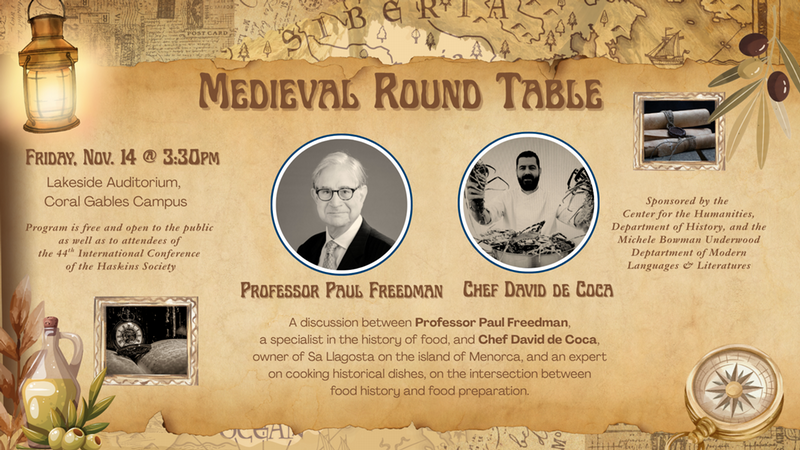
Tuesday, November 11, 2025 @ 2:00pm
Coral Gables Campus, Centennial Village Dining Hall
"Tapas from the Mediterranean: A Showcooking Event by David de Coca"
Join us for an exciting show-cooking with Chef David de Coca from Menorca, Spain!
Click the banner above to RSVP by Thursday, November 6
We extended resgistration for this program but are ending it by noon today (Monday, November 10) to allow for planning and preparation.
CLICK HERE for a banner to print or share!
- RSVP is required for all attendees
- Student tickets are FREE with Student Meal Plan
Chef David de Coca will offer a live demonstration of Mediterranean and Menorcan tapas inspired by traditional recipes and seasonal ingredients. The show-cooking will showcase how local dishes evolve through time and creativity. Attendees will have the opportunity to observe the preparation process, engage in conversation with the chef, and enjoy tastings that reflect the flavors, stories, and cultural flavors of the Mediterranean table.

Chef David de Coca is a Spanish chef and the creative force behind Sa Llagosta, a renowned seafood restaurant in the port town of Fornells, Menorca (Spain). With a culinary philosophy centered on seasonality, sustainability, and simplicity, Chef de Coca has earned international recognition for reinterpreting regional recipes with a contemporary and ethnographic sensibility. Over the years, he has collaborated with internationally acclaimed chefs, including Michelin-starred figures, and his work has been featured in both national and international media. Passionate about culinary heritage and cultural storytelling, he frequently participates in public-facing events that explore the intersection of tradition, innovation, and identity through food.
Sponsored by the Center for the Humanities, Department of History, and the Michele Bowman Underwood Department of Modern Languages & Literatures

Friday, November 14, 2025 @ 3:30pm
Lakeside Pavillion, Coral Gables Campus
"Medieval Round Table with Professor Paul Freedman and Chef David de Coca"
Join us for a roundtable discussion on Catalan cuisine with Chef David de Coca and Professor Paul Freedman! Click the banner above to RSVP and confirm your attendance.
A discussion between Paul Freedman, a specialist in the history of food, and Chef David de Coca, owner of Sa Llagosta on the island of Menorca, and an expert on cooking historical dishes, on the intersection between food history and food preparation. What are the rewards of cooking historical recipes? What are the challenges of presenting them to a contemporary audience? How can academic research help chefs in presenting traditional cuisine? How can chefs help historians think about the history of food?
This program is free and open to the public as well as held in conjunction with the 44th International Conference of the Haskins Society at the University of Miami.
Sponsored by the Center for the Humanities, Department of History, the Michele Bowman Underwood Department of Modern Languages & Literatures, and the Joseph Carter Memorial Fund






